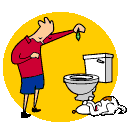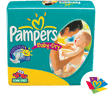HOW DO I REPORT A SEWER EMERGENCY?
If you are experiencing a sewer emergency please call County Dispatch at 856-939-3354
Homeowner is responsible to know location of clean out and maintain access. The lateral lid and/or plug must be intact to prevent debris and rain water entering into system.
You can help prevent sewer backups
Prevent Sewer Backups
Sewer backups are both destructive and unpleasant. As a customer you can do many things to prevent your line from backing up. Remember too, that the very same things can help prevent backups in the main sewer line as well.
If everyone would be careful about the ways they dispose of certain products our system would be more efficient, cause fewer backups, cost less money, and prevent the inconvenience to you.
More often than not, the cause of a backup in your sewer line is from items that the line is not meant to handle, such as kid’s toys, towels, diapers, paper products (other than toilet paper), keys and even false teeth. To avoid flushing these items, remember to close the toilet lid. What you flush down your toilet may not affect you, but it might cause problems for your neighbors!
Subjects that will help you avoid a sewer backup:
- Grease: Grease can enter the sewer at virtually any point, including your kitchen sink. You might think that it can’t do any harm to allow a small amount of grease to go down the drain as you are cleaning up, especially if you rinse with very hot water. But hot water cools quickly, and so does hot grease. When it cools, it solidifies. Imagine that tiny amount of grease that slips down your drain multiplied several thousand times solidifying as it cools, sticking to the insides of sewer pipes, trapping food particles and all kinds of other debris in the wastewater. Over time, this messy mass can grow until the flow of water is obstructed and sewage begins to back up.
- Paper Products: Paper towels, disposable (and cloth) diapers, and feminine products cause a great deal of problems in the property owner’s line as well as the main. These products do not deteriorate quickly, as does bathroom tissue. They become lodged in portions of the lines where there is accumulation of any type of debris, and dam up the line, causing sewer backup. These products should also be disposed of in the garbage can.
- Roots: Shrubs and trees, seeking moisture, will make their way into sewer line cracks. These roots can do a lot of damage. They start out small, getting into a small crack in the pipe; but as the tree shrub continues to grow, so does the toot. This obviously, after time goes on, causes your sewer line to break, which in turn allows debris to hang up in the sewer line, thus causing a backup. One way to prevent roots from entering your line is to replace your line and tap with new plastic pipe. The other alternative is to be careful about planting greenery around your sewer line. We suggest that you have the roots cut in your line semi-annually.
- Needles: Disposing of hypodermic needles into the sewer system presents special and possible harmful problems for the wastewater collection and wastewater treatment employees. Please DO NOT flush needles. The proper method of disposal is to re-cap the needle and put it into a “sharps container”.
PLEASE DO NOT FLUSH THEM OR THROW THEM INTO THE GARBAGE
Options for Disposal:
- Most clinics and hospital have collection programs for needles and syringes used by their patients at home. Ask your healthcare provider if your clinic or hospital has a collection program. If so, follow their storage and disposal instructions. Do not bring used needles and syringes to your clinic or hospital if they are unable to accept them.
You can help…
 Don’t use your toilet as a trash can
Don’t use your toilet as a trash can
 Don’t flush disinfecting wipes down the toilet
Don’t flush disinfecting wipes down the toilet
 Don’t flush paper towels down the toilet
Don’t flush paper towels down the toilet
 Don’t flush baby wipes down the toilet
Don’t flush baby wipes down the toilet
 Don’t flush needles down the toilet
Don’t flush needles down the toilet
